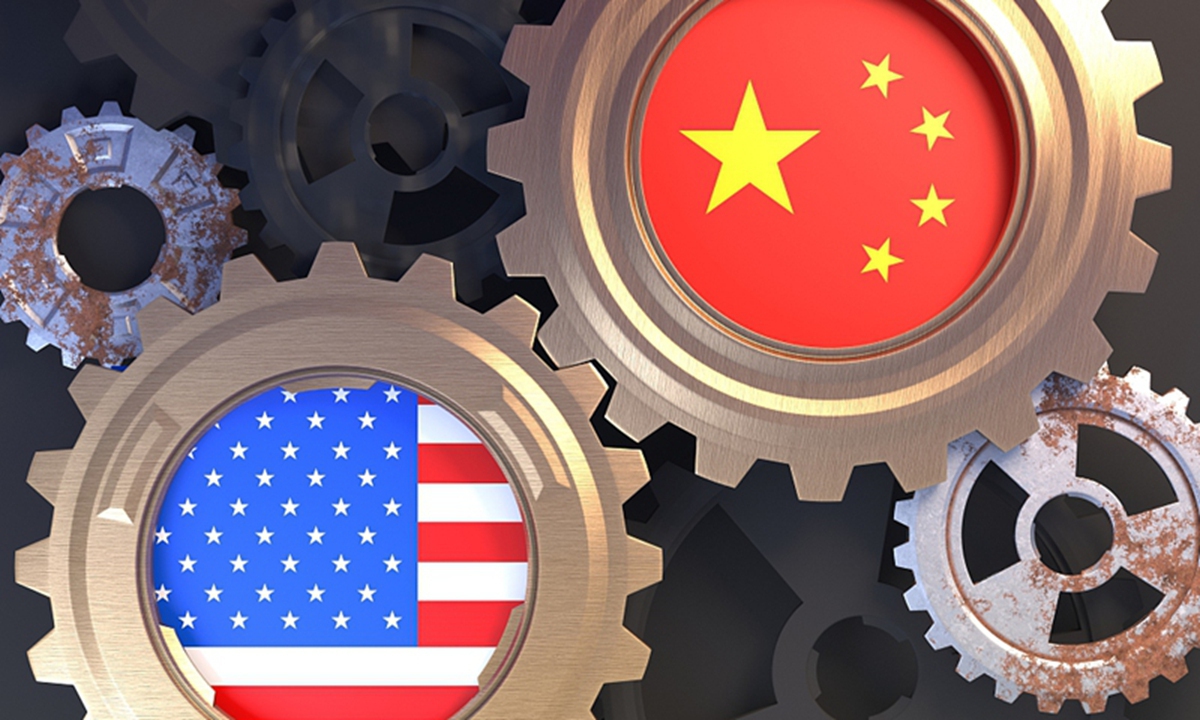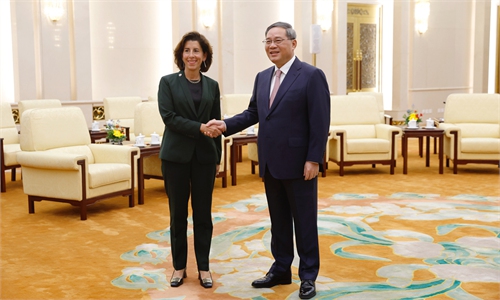US not making substantive steps to improve ties with China despite détente atmosphere
Biden admin needs courage to balance domestic political mess, wavering China policy: experts

File photo: China US
Although US Commerce Secretary Gina Raimondo's visit to China and recent military contacts between the two countries have brought an atmosphere of détente to China-US relations, the US, from the White House to Congress, has not stopped its provocation of China on the Taiwan question and hyped issues over a G20 head-of state meeting before its official announcement.
Experts said that the US' wavering China policy shows its internal chaos in the face of multiple real benefits from improving ties with China. Under China's responsible management of bilateral ties, the momentum of high-level official interactions since June is likely to continue for the rest of the year, but the US should not abuse China's sincerity, and a confrontational mentality will also harm its interests.
Raimondo wrapped up her "successful and productive" four-day high-stakes visit to China on Wednesday, with the visit yielding material results, including the establishment of new communication channels to seek solutions to specific business issues and support for enterprises of the two countries in carrying out pragmatic cooperation.
On Thursday, China's Ministry of National Defense confirmed that senior military officials from China and the US have held talks in Fiji, making it reportedly the first offline exchange between senior officials of the two militaries this year.
While Raimondo was still in China, the Biden administration on Wednesday approved a military transfer of up to $80 million to the island of Taiwan under "Foreign Military Financing," which is normally used for sovereign states. A spokesperson of the Taiwan Affairs Office of the State Council Chen Binhua on Friday expressed strong opposition, and stressed China's firm will and capacity in safeguarding national sovereignty.
The US has also been putting pressure on China through the media. Citing officials, NBC said on Thursday that President Biden does not plan to formally meet with Chinese President Xi Jinping in the G20 summit in India in September, as the Chinese leader's attendance is still "unclear." Chinese Foreign Ministry Spokesperson Wang Wenbin said on Friday that China will release related information in time.
Since US Secretary of State Antony Blinken's visit to China in June, China-US relations have entered a period of détente, and Raimondo's visit has proved that the window is opening, Lü Xiang, a research fellow at the Chinese Academy of Social Sciences, told the Global Times on Friday.
But so far, we have not seen any real or substantive steps from the US to improve bilateral relations, Lü said.
Li Haidong, a professor at the China Foreign Affairs University, told the Global Times that the actions of the US on the Taiwan question will make China feel that it still carries a lot of hostility.
It is difficult to ensure that China's sincerity will not be abused by US politicians, but China will strive to manage its relations with the US responsibly and let the international community better understand China's wish for peace and stability, Li said.
The expert noted that high-level interactions between China and the US at the G20 and APEC summits are highly likely, which means that the momentum of engagement and exchange since June will continue in the second half of 2023. Generally speaking, China-US relations will continue to include both dialogue and competition, but the competition is not expected to evolve into conflict. However, with the US presidential election to be held next year, uncertainties will increase.
Balancing act needed
During her China trip on Wednesday in Shanghai, Raimondo urged US businesses to keep expanding investment in China, according to CNN. However, this comes in contrast to her comment that the world's second biggest economy had become "uninvestable."
Meanwhile, a US scholar described Raimondo's move as "bold," after she announced a working group on commercial issues and a new export control enforcement "information exchange" dialogue on Monday, defying China hawks in Congress, according to a CNN report.
The above case is one of the illustrations of Washington's chaotic and disorganized China policy, analysts believe. Days after Raimondo's China tour, Rob Wittman, vice chairman of the House Armed Services Committee, who is leading a US congressional delegation to Taiwan island, said on Friday that the US would act if the island were attacked and promised to resolve the $19 billion backlog in US arm sales, according to a VOA report.
The relationship between China and the US is linked by multiple dimensions, which means that the US will vacillate according to its practical interests, Li said.
"And US politics is in disarray: the lack of consensus and consistency within the Biden administration, congressional obstruction, as well as the polarized partisanship makes the US move into a track of habitual confrontation instead of expanding the areas of cooperation that should have been pursued," said Li.
If the US wants to take all the benefits and leave all the risks to China, it will be difficult for China and the US to cooperate, and without cooperation with Beijing, Washington is unable to solve its major problems, which in turn makes its foreign policy meaningless, Li said.
The US views China as a strategic rival, and that is difficult to change. But the reality requires both sides to improve relations, and antagonism in US policies and among some politicians is damaging China-US relations, Li said.
It doesn't take too much wisdom, but will take some courage, for the Biden administration to take some concrete steps to improve relations with China, Lü said.
It is true that the US has some extreme China hawks, but if the White House's foreign policy is dominated by these politicians, then the Biden administration will lose its diplomatic function, Lü said.
The expert noted that even the former Donald Trump administration, which is considered to have performed poorly, signed a phase-one trade deal with China in 2020 at a time when bilateral ties were at a low ebb, so there is no reason for Biden not to do better in balancing ties and his domestic mess.
We hope that President Biden can do something beneficial for both China and the US through practical actions, and at the same time save his reputation and support rate, Lü said.



